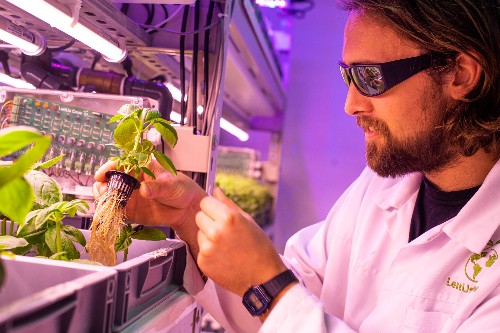The seed for LettUs Grow was sown in response to the growing threat of climate change and global food insecurity by developing a vertical and indoor farming system that grows plants suspended in the air using a mist to deliver nutrients. This provides consistent, climate-resilient year-round harvests without using fertile land or pesticides, and using 95% less water.
They recently delivered an aeroponic container farm, called DROP & GROW, to HM Prison Hewell in Worcestershire where Prisoners will be introduced to indoor farming practices to gain experience in a fast growing industry and train in horticulture, with the aim of helping them secure full-time employment upon release.
Charlie Guy, who founded LettUs Grow while still studying for his Masters in Engineering Design alongside two other Bristol University students, Ben Crowther (Engineering Design) and Jack farmer (Plant Biology) said he was excited to be involved in a project that would have both an environmental and social impact. He said: “In the first half of this year alone, an estimated £22 million worth of fruit and vegetables has been wasted directly because of workforce shortages in agriculture.
“The program we're supporting at HMP Hewell, trains people in highly skilled work in a growing industry. Unlike typical agricultural work, indoor farming employment is much more stable as it's year-round and not ruled by the seasons. It's a unique development activity for prisoners, providing an introduction to an industry where there are good opportunities for career development, whilst contributing to their own food production in the prison as well.”
The main purpose of the farm is training rather than food production. The salad, vegetables and herbs produced in the container farm will be incorporated into prisoner meals. The prisoners will learn plant husbandry skills, how aeroponics works, how to use a farm management software platform, indoor farm standard operating procedures, as well as Hazard Analysis Critical Control Point (HACCP) and Food Safety.
They will also be taught how to grow plants with state of the art ultrasonic aeroponic technology. Aeroponics is a method of growing plants without soil, in a nutrient-rich mist.
Prisons Minister Stuart Andrew MP said: “This innovative scheme reflects our drive to equip prisoners with the cutting-edge practical skills needed to gain employment and play a positive role in society.
“Allied to education, family ties and addiction treatment, stable work holds the key to a life free from crime and safer communities for us all.”
Only 17% of ex-offenders manage to secure a job within a year of release. Employment is a key pillar of the Government’s strategy for rehabilitation as it’s one of the most effective ways of improving life quality and reducing re-offending. This is the first governmental institution in the UK to have brought controlled environmental agriculture into the prison system.
Ralph Lubowski, Governor of HMP said: "I am delighted to partner with LettUs Grow in this fantastic initiative, which will give our prisoners the opportunity, confidence and training to turn their lives around.
“Vertical farming is an innovative, emerging industry and this partnership highlights our commitment to ensuring that prisoners are skilled up to find work on release."
Billy Rodgers, Growing Specialist and Partner Support Manager at LettUs Grow, said: “We’re offering an extra level of support, on top of the usual training, for this project by putting together growing plans, managing consumables like seeds or fertiliser, and delivering at regular intervals throughout the year.
“The aim is to take pressure off Site Managers and make running the farm as easy as possible by creating a structure to follow. This means they can focus on what’s most important: upskilling, empowering and rehabilitating the prisoners.”
